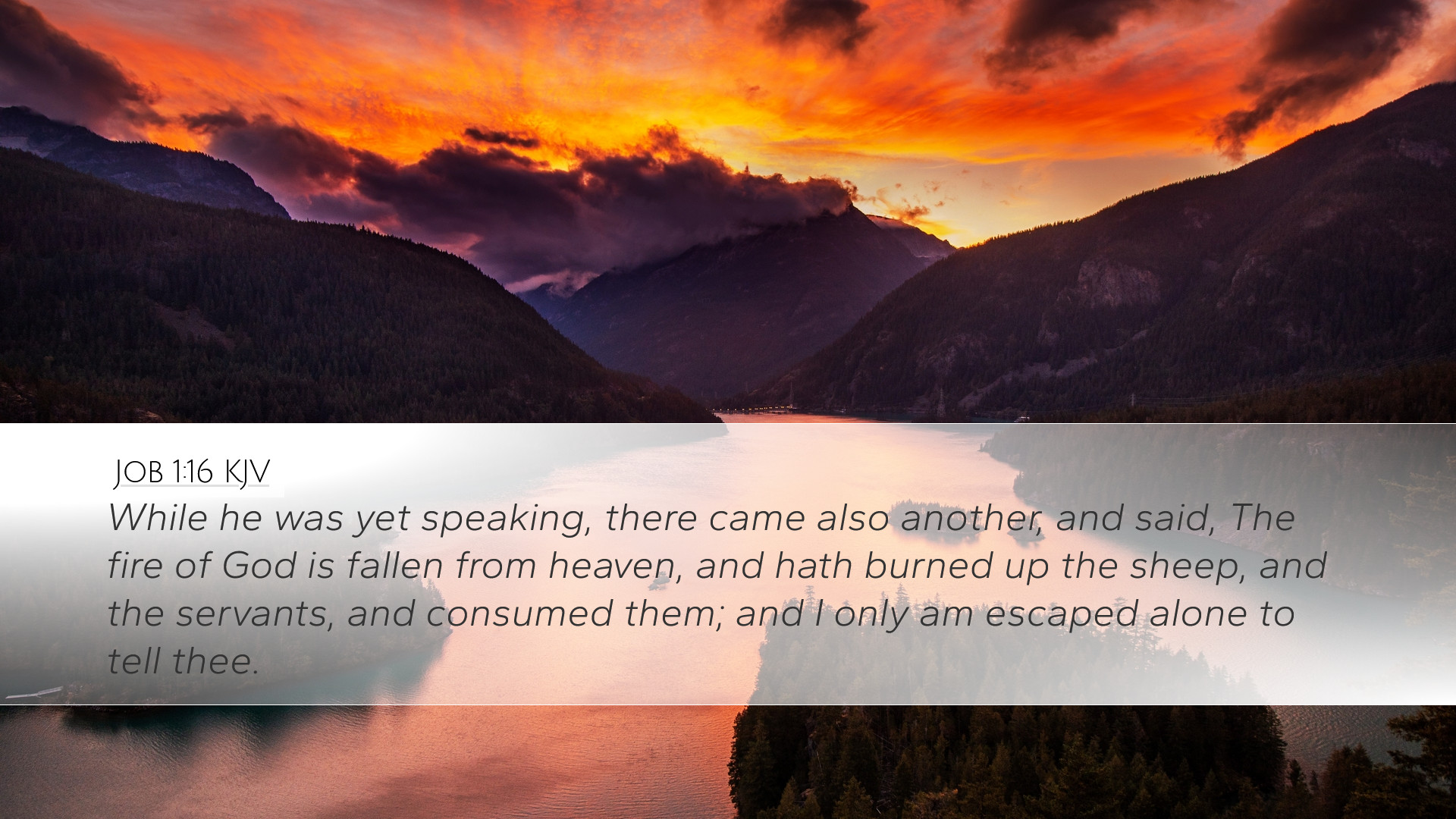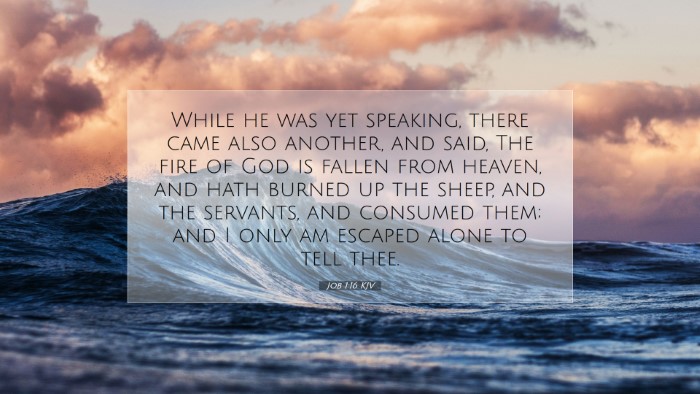Old Testament
Genesis Exodus Leviticus Numbers Deuteronomy Joshua Judges Ruth 1 Samuel 2 Samuel 1 Kings 2 Kings 1 Chronicles 2 Chronicles Ezra Nehemiah Esther Job Psalms Proverbs Ecclesiastes Song of Solomon Isaiah Jeremiah Lamentations Ezekiel Daniel Hosea Joel Amos Obadiah Jonah Micah Nahum Habakkuk Zephaniah Haggai Zechariah MalachiJob 1:16
Job 1:16 KJV
While he was yet speaking, there came also another, and said, The fire of God is fallen from heaven, and hath burned up the sheep, and the servants, and consumed them; and I only am escaped alone to tell thee.
Job 1:16 Bible Commentary
Commentary on Job 1:16
Job 1:16 states: "While he was yet speaking, there came also another, and said, The fire of God is fallen from heaven, and hath burned up the sheep, and the servants, and consumed them; and I only am escaped alone to tell thee."
Overview
This verse presents one of the pivotal moments in the Book of Job, where the calamities befalling Job are intensified. It illustrates the dual themes of suffering and divine sovereignty while shedding light on the profound tragedy that befalls the righteous individual.
Insights from Public Domain Commentaries
Matthew Henry’s Commentary
Henry emphasizes the suddenness of Job’s trials, noting that news of calamity arrives in rapid succession, each messenger adding to Job’s grief. He considers the element of divine providence evident in how these disasters are presented. The phrase "the fire of God" denotes that these events should not be viewed simply as natural occurrences, but as instruments of divine judgment or testing.
The Role of Messengers
Henry also comments on the messengers themselves, who experience the shocking calamities first-hand. Their purpose is not merely to deliver bad news, but they embody the idea of humanity's vulnerability in the face of divine control. The messenger's fear and urgency underscore the severity of the situation and the gravity of Job's loss.
Albert Barnes’ Notes on the Bible
Barnes underlines the use of "the fire of God" and links it to divine intervention, reflecting on God's ultimate authority over nature. He argues that such phrases serve a didactic purpose by illustrating that all things come under God’s power, especially during times of trial. This allows us to see God at work even when circumstances appear dire.
Theological Implications
Barnes posits that this event serves as a test of Job’s faith and resilience. It challenges the reader to understand the nature of suffering in the life of a believer. He encourages the interpretation that even amidst suffering, God's plan is sovereign, and thus faith is not always tied to material prosperity.
Adam Clarke’s Commentary
Clarke provides a comprehensive examination of the phrase "the fire of God", suggesting that it indicates miraculous destruction. He explains that despite the misfortunes Job faces, he remains a figure of righteousness. Clarke notes that this reflects on the nature of suffering: it does not necessarily result from personal sin but can serve a divine purpose.
The Nature of Affliction
Clarke argues that affliction can be both a testing ground and a means of education for the believer. He proposes that calamities such as those faced by Job serve to strengthen faith and bring the individual closer to God. Suffering, then, is not the absence of God’s grace but a part of the journey of faith.
The Importance of Context
Understanding this verse requires an appreciation for its literary context within the Book of Job. The scope of suffering that Job experiences serves as a backdrop against which his integrity and faithfulness can be measured. The swift recounting of multiple disasters emphasizes the relentlessness of Job's challenges and establishes a tone of urgency and despair.
Theological Reflections
- Divine Sovereignty: The calamities serve as a reminder of God’s power and control over all creation, urging believers to trust in His overarching plans regardless of their circumstances.
- Human Suffering: The verse encapsulates a pivotal theme of the human experience—suffering is universal, yet the reasons behind it and the responses it elicits vary significantly among individuals.
- Faith Under Trial: Believers are encouraged to respond to suffering with faith and perseverance, as exemplified by Job’s intrinsic trust in God even amid despair.
Conclusion
Job 1:16 invites profound reflection on the nature of suffering, divine sovereignty, and human faithfulness. By examining this verse through the lenses of respected commentaries, we uncover deeper insights that can guide pastors, students, and theologians in their understanding of God’s work in the world. Through grappling with the complexities of the Book of Job, believers find perspectives that challenge simplistic narratives about good and evil, prompting richer dialogues about faith amidst trials.


